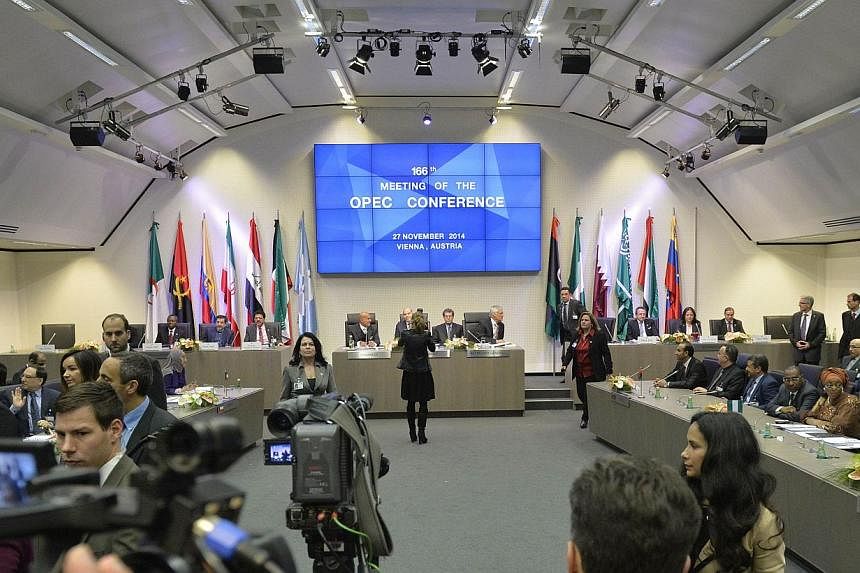VIENNA (AFP) - Opec on Thursday decided against cutting the amount of oil it produces despite a glut in global supplies, triggering a fresh collapse in crude prices.
The cartel pumping out one-third of the world's oil opted to stick by its output target, even after prices have plunged by more than a third in value since June.
The 12-nation cartel "decided to maintain the production level of 30 million barrels per day" where it has stood for three years, the Organisation of Petroleum Exporting Countries said in a communique.
Going into the meeting in Vienna, Opec faced pressure from its poorer members, notably Venezuela and Ecuador, to cut output as collapsing prices slashed their precious revenues.
But its powerful Gulf members rejected calls to turn down the taps unless they are guaranteed market share in the highly competitive arena, particularly in the United States, where a flood of cheaper oil from shale rock has contributed to the global oversupply.
"We should withdraw the overproduction from the market," Venezuelan Foreign Minister Rafael Ramirez told reporters ahead of Thursday's outcome.
The Opec decision sent world oil prices tumbling to fresh four-year lows.
New York's West Texas Intermediate for January slumped to US$69.11 a barrel - the lowest level since May 2010.
London's Brent North Sea crude for January delivery dived to US$72.74 - also a four-year trough.
Crude prices have collapsed by 35 per cent since June, depressed also by a strong dollar and worries about stalling energy demand in a weak global economy.
The International Energy Agency (IEA) warned in a recent report that the "price rout" was not over, and that crude futures would slide well into 2015.
Plunging oil prices have fanned concerns about the growing threat of deflation in the world economy, and particularly in the euro zone.
While falling consumer prices may sound good for consumers, deflation can trigger a vicious spiral where businesses and households delay purchases, throttling demand and causing companies to lay off workers.
OPEC PUMPS ABOVE TARGET
Opec pumped 30.6 million oil barrels per day last month, above its 30 million bpd target according to the IEA, which advises countries on energy policy.
Ahead of the meeting, Opec kingpin and world's top oil producer Saudi Arabia cut charges for US customers in a move seen as a bid to maintain its market share amid increasing competition there from shale energy.
Opec has meanwhile insisted that it is not solely up to the cartel to tackle the oversupply that is sending crude prices crashing.
Officials from Saudi Arabia met with their counterparts from Venezuela and non-Opec oil producers Russia and Mexico in Vienna on Tuesday.
Following the surprise gathering, Russian oil giant Rosneft said it had trimmed its daily output by 25,000 barrels because of "market conditions".
The token reduction represented less than 1 per cent of the behemoth's total and did nothing to boost energy prices on depressed global commodity markets.
Opec will hold its next production meeting in June next year, as previously announced.

